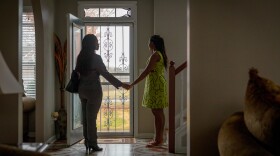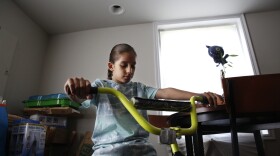Late on April 15, Brandon Hole stepped out of his car at an Indianapolis FedEx facility. Armed with a rifle, he shot and killed four people outside before moving inside to kill four more. Then Hole, 19, turned the gun on himself.
That night wasn’t Hole’s first interaction with police. In March 2020, his mother called the police because she was worried her son would try to commit “suicide by cop.” Hole was placed under immediate detention and taken to a local hospital.

In the aftermath of mass shootings, observers often point to mental health services as a solution to prevention. But accessing treatment remains out of reach for many in Indiana and nationwide, and the limitations of this kind of emergency behavioral health care are not well understood.
“The individual was involuntarily committed for a brief period of time,” Marion County Prosecutor Ryan Mears said about Hole. “But I will tell you that the length of that stay was measured by hours and not days or weeks, and no follow up medication was prescribed to this particular individual.”
There are many unknowns about Hole’s case, but IU Health psychiatrist Dr. Diane Reis said being discharged quickly and without medication does not necessarily mean it was not taken seriously.
“It may mean, either that he refused medication (or) that the psychiatrist or emergency physician or whoever saw them felt that it wasn't safe or appropriate to start [medication] in an emergency room setting where there wasn't sort of an immediate clear handoff to outpatient follow-up,” Reis said.
Research shows the vast majority of people with mental illness never commit violence.
“There are certainly situations where people with severe mental illness can engage in dangerous behaviors as a result of their illness,” Reis said. “But that is not the rule. That's the exception.”
Limitations on admissions
Toward the back of IU Methodist’s emergency room is a five-room area called secure holding. Someone experiencing a mental health crisis in that area is still considered an ER patient. Reis said people may stay in secure holding anywhere between a few hours or several days.
“It gives us the flexibility to again have somebody in a space that's designed more for safety,” Reis said.
There are three ways someone can legally be admitted to a psychiatric unit in Indiana:
- The patient may volunteer to enter treatment, agreeing that a stay in an inpatient psychiatric unit is necessary.
- A 72-hour hold, or emergency detention, allows a hospital to keep someone in its care for three business days. This route must be approved by a county judge, and it is largely for continued observation by medical staff. Even if the patient is under emergency detention, doctors cannot compel them to comply with treatment or take medications.
- Court commitment, which goes further than emergency detention, can be used.

“It's essentially a hospital or health care mental health care provider asking a mental health judge to commit somebody for treatment,” Reis said. “The stipulations of that commitment can include things like medication.”
The hospital must convince a judge there is an imminent risk if this person doesn’t receive treatment. Reis said this isn’t a theoretical danger.
“It's like this person's judgment is so impaired that the second we turn their back on them, they are engaging in lighting fires, and it's putting them in danger,” Reis said.
Getting Care
Reis said she often wants to admit someone for inpatient psychiatric treatment but there may be no available beds. Hospitals without in-patient facilities must find openings at other hospitals, which may already have too few beds for psychiatric patients.
Another challenge is finding an appointment with a psychiatrist for outpatient care.
“If I see somebody in an emergency room, even if they call that day, it may be two or three months before a psychiatrist lays eyes on them in an outpatient setting,” Reis said. “For a motivated patient who's trying to get treatment.”
Nationally, there are about 13 psychiatrists for every 100,000 people. In Indiana, there are only six for every 100,000 people -- among the worst ratios in the U.S. And while other mental health professionals can offer therapy or counseling, the power to prescribe medicine is more limited.
Right now, more psychiatrists are retiring than replacements are being trained. There are less than two dozen psychiatry residency slots open each year in Indiana.
Some argue more robust access to counseling or outpatient care could ease the burden on the mental health care system.
“We do need better funding, more robust workforce, more support," Reis said. "We need more truthful public conversations, all of that related to mental health. There's a lot of really smart people in the state of Indiana who already know great ways to improve that.”
Missed opportunity, misconceptions
After being taken to the hospital by police, Hole was released within a few hours. It remains unclear what treatment he received, if he was ever diagnosed with a mental health condition, or what happened in the year leading up to the shooting. In a statement, his family said they tried to get him help.
“I think that the mental health system, in many jurisdictions, is lacking,” said Keith Ross, a professor at the John Jay School of Criminal Justice. “And when I say lacking, not in initial assessment, but in follow-ups.”
Ross said the ability for police, social workers or hospital staff to reconnect with people who have needed emergency mental health care could prevent future police interactions.
In northwest Indiana, Griffith Police Department social worker Erica Rios is working to provide this kind of follow-up care.
“(The) silos that we work in are huge,” Rios said. “People kind of do their job and move along. And sometimes we forget to connect.”
She said she reconnects with and supports people who have experienced drug overdoses or stayed in the hospital on a 72-hour hold. Sometimes this means helping pay bills, setting them up with health insurance or scheduling future appointments.
But Rios often encounters misunderstandings about the mental health care system.
“You can't just say someone's crazy and put them away for 72 hours,” Rios said. “That's what the public doesn't seem to understand when they call us.”
Griffith, Indiana has slightly more than 16,000 residents. Rios said she benefits from being in a small community, whereas large metropolitan areas may struggle to offer the same services.
“It's like, you know, crisis doesn't stop because you're following up on another crisis,” Rios said.
This story was produced by Side Effects Public Media, a news collaborative covering public health.
The National Suicide Prevention Lifeline is a hotline for individuals in crisis or for those looking to help someone else. To speak with a certified listener, call 1-800-273-8255.
Crisis Text Line is a texting service for emotional crisis support. To speak with a trained listener, text HELLO to 741741. It is free, available 24/7, and confidential.







